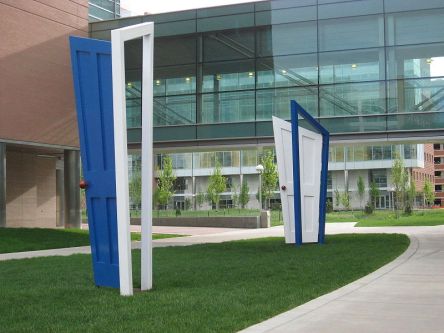
(« Artwork on the Anschutz Medical Campus » by Rinaldodsouza)
The conclusion of the suite, « Epilogue, » is a short section wherein I present my interpretation of the parable. The music is basically a reprise of the introduction, with a very simple acoustic guitar and vocals arrangement, so as to give all the space to the lyrics :
There is no wall confining you
There used to be, but you've left it behind
There is no guard here to stop you
The one you fear is a voice you designed
No obstacles in front of you
The ones you see are only in your mind
There is no law preventing you
To live your dream free yourself from your bind
The roshi has slammed the zendo's door in Simon's face, causing him to reach awakening. It isn't said to what Simon was actually awaken, so there's plenty of room for interpretation. Here's mine :
In my view, the man at the door of the law commits the mistake of choosing the reasonable approach, and, as Kafka puts it, « decides that it is better to wait until he gets permission to enter. » The man sees that the door is guarded, he is being told that he cannot pass, and that there are even worst difficulties ahead, but in fact the gate is open, and moreover the guard has stepped aside. The man attempts to be admitted by bribery, but he doesn't try to simply walk through the door.
So, in this perspective, by slamming the door in his student's face the roshi effectively signifies « here's a closed door. »
That being said, I think Wilson's point is that different readers will have different explanations, just as it is with koans which require one to find their own answer for themselves. What is yours ?
Is there such a door of the law in your world at this very moment ? A situation from which you want to move on, but which looks as if it won't change no matter how much effort you exert. Why don't you give it another try ?


Comments